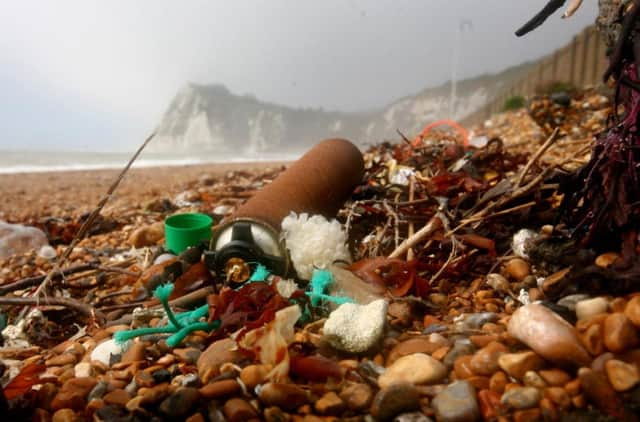The wet wipes invading UK beaches


The Marine Conservation Society says “flushable” wet wipes have entered their list of the top 20 most common items of litter for the first time as more people use them rather than toilet paper to remove make-up and to apply fake tan.
Numbers found on beaches have rocketed by 50 per cent this year, according to the MCS’s annual survey of more than 300 beaches, carried out by volunteers last September.
Advertisement
Hide AdAdvertisement
Hide AdIts “Great British Beach Clean” which included 13 beaches in Yorkshire, found litter overall was up 6.4 per cent on the year.
Nearly 4,400 items were found on a stretch of Hessle Foreshore, near Hull, on the Humber estuary, by a 70-strong force of volunteers, in just a couple of hours.
Wet wipes don’t break down like toilet paper and can cause blockages in sewers, leading to discharges into the sea. Earlier this year Southern Water revealed over 2,000 tons of wet wipes were playing havoc with sewers in Kent, while research for United Utilities in the North West showed one in 10 households have had blocked toilets and drains due to baby and make-up wipes and other non-flushables.
The most commonly-collected type of rubbish was pieces of plastic - which like wipes animals sometimes mistakenly eat but cannot digest - while 10 per cent of the litter collected was plastic drink bottles and aluminium drinks cans while 11 per cent was related to commercial and recreational fishing.
Advertisement
Hide AdAdvertisement
Hide AdVolunteers also found some unusual items including a colostomy bag, a plastic hand, a bra strap and, on one beach, nine pairs of shoes of various sizes.
MCS Beachwatch officer Charlotte Coombes said: “Our sewerage systems weren’t built to cope with wet wipes.
“When flushed they don’t disintegrate like toilet paper, and they typically contain plastic so once they reach the sea, they last for a very long time.
“They can cause blockages in our sewers, and then, everything else that has been flushed down the loo can either back up into people’s homes, or overflow into rivers and seas.
Advertisement
Hide AdAdvertisement
Hide Ad“Overflows also happen during excessive rainfall, or if the plumbing hasn’t been connected up properly meaning the wrong pipes are heading straight to the sea.
“That’s when we find sewage-related debris, including wet wipes, on the beach.”